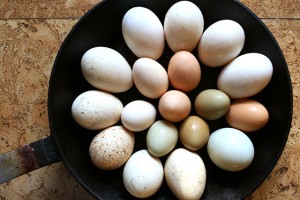I love eggs, oh so much. They are the reason I could never truly go vegan. I love the way they look and taste. I even love the word. Egg. Eeeeeegg. Eg-g-g-g-g-g-g-g. Eggy. Just lovely.
As a vegetarian, I quickly realized the importance of eggs as a source of protein and iron. I figured it out a couple weeks in to the veggie-venture, when I started craving eggs like crazy – they were all I could think about.
Here’s a quick rundown of the nutrition we get from one typical, medium egg:
- 60 calories, 35 of them from fat
- 60 milligrams of potassium
- 6 grams of protein
- Vitamin A – 4% rda
- Vitamin B-6 – 4% rda
- Vitamin B-12 – 6% rda
- Vitamin D – 10% rda
- Calcium – 2% rda
- Folate – 6% rda
- Iron – 4% rda
- Phosphorus – 8% rda
- Zinc – 4% rda
Do Eggs Make Us Fat and Hurt Our Hearts?
No, not in and of themselves. Yes, it’s true that egg yolks hold the “bad” stuff like fat and cholesterol, lots of cholesterol. But they also hold the iron. And it’s important to understand that some cholesterol in your diet (in limited amounts), is not all that bad for you – a healthy body will process it well and keep your bloodlines clean. If you are limiting the unhealthy fats and cholesterol in your overall diet, a whole egg (ideally one a day) is not going to hurt you.
Eggy Perspective
With all of this in mind, I started bringing boiled and peeled eggs to work, one for each day, in a container. Then, I discovered how good a soft to medium boiled egg was mixed in with my plain steel-cut oatmeal. It doesn’t look very appetizing, but the taste and texture are extremely satiating.
I’ve now become an egg snob. When I can’t get the local, free-range (truly free-range) organic type from the farmers’ market, I opt for the next best organics in the supermarket. They are almost always various shades of brown.
Note – the color of an egg does not really indicate the health or nutrition of the egg. The hue is determined by the color of the hen the egg came from. I imagine the poor little ladies in the awful cages of the mass-producers are all white.
Personally, I love opening an egg carton from my friend’s dad’s farm. I’ve gotten everything from white to greenish-blue to dark brown. Better than Easter.
Why is an organic, free range egg better than one from the cooped up, grain-fed hens of the big farms? The short version is that a hen that is free to roam in grass and not treated with antibiotics and hormones will a) eat a diet its body is designed for, b) get exercise to make it leaner and c) not be full of the hormone-disruptors and scary chemicals we don’t need. Makes sense.
But, it’s important to be a smart consumer. “Organic” does not necessarily mean healthier, and “free-range” doesn’t always mean free hens. Those words are as prone to marketing gimmickry as “natural” and “earth. ” While it can’t hurt to opt for such items, as they do indicate some level of standard, know that an organic egg could come from a caged chicken, and a free-ranger might not really get much chance to roam, and consume an unnatural and chemically-laden diet.
For more in that vein, check out the Huffington Post article below.
If you can, buy your eggs from a small local farmer who uses minimal grain feed and allows the hens to wander at will. Weigh the factors, looking for an egg that came from a happy chicken who doesn’t sit in its own filth and have indigestion from an unnatural diet. The benefits will include an egg with more omega-3s, fewer chemicals and more complex taste.
Welcome to egg snobbery!
Sources:
Huffington Post: Organic vs. Conventional: Have You Been Robbed?
Image from Grub Street New York


Eggcellent article!
HA! Thanks:)